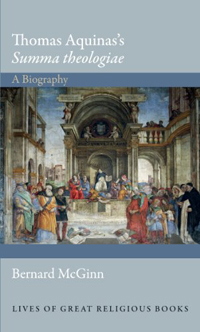 Bernard McGinn, Thomas Aquinas’s Summa theologiae: A Biography (Lives of Great Religious Books) (Princeton: Princeton University Press, 2014), 260pp.
Bernard McGinn, Thomas Aquinas’s Summa theologiae: A Biography (Lives of Great Religious Books) (Princeton: Princeton University Press, 2014), 260pp.
A review by Ron Hansen.
The Latin summa theologiae can be translated as the “whole,” “total,” “summary,” “marrow,” or “climax” of theology, and all those nouns seem fitting for the work of genius so lucidly described by Professor Bernard McGinn of the Divinity School at the University of Chicago. Written in Paris and Rome by the Dominican friar Thomas Aquinas (1225–1274), “the Summa,” he states, “is a massive work, containing over a million and a half words divided into three large parts containing 512 topics (quaestiones) and no fewer than 2,668 articles (articuli) dealing with particular issues.”
Like many medieval theologians, Aquinas was deeply influenced by Aristotle and used his method of questioning (“the essential operation of the human mind”) to introduce seminarians and theology students to the Christian faith and to offer helps in defending that faith from hostile attacks. He did not confine his discussions to biblical sources, however, but incorporated the philosophy of Hebrews, Muslims, and pagans, citing such thinkers as Anselm, Augustine of Hippo, Al-Ghazali, Boethius, Cicero, Dionysius the Areopagite, Maimonides, and Plato — Aquinas’s photographic memory enabling him to recall word by word virtually everything he’d ever read.
McGinn describes a humble, corpulent, taciturn Italian friar who even while holding a chair in theology and carrying out the duties of a Dominican priest employed two secretaries in order to dictate his thoughts in Latin at a rate of more than twelve pages a day. In his seven years composing his instructional guide, he filled, in an English translation, 2,565 double-column pages. And then something happened, perhaps a stroke or even a beatific vision, for in December, 1273, he ended his writing career and he died just three months later. His amanuensis and minder “noted that Friar Thomas was even more abstracted than ever and asked why he was no longer writing. Thomas replied, ‘Reginald, I cannot, because all I have written seems like straw to me.’”
Professor McGinn offers a learned, concise, very accessible tour through the Summa theologiae, notes its importance to the Christendom of the Middle Ages, its disparagement during the Enlightenment and flourishing later, and its relevance even in the post-Vatican II Catholic Church. His biography of Aquinas’s multi-volume work, like all great teaching, is fascinating, entertaining, and rich with insight. I have no doubt that I’ll be returning to it again.


